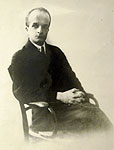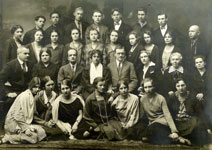- «Portuguese Homer» Luís de Camões
- Poem «The Lusiads»
- Mikhail Travchetov – the Translator of «The Lusiads»
- Manuscript of M. Travchetov's Translation
- Reference Literarure
Mikhail Travchetov – the Translator of «The Lusiads»
Mikhail Travchetov was fated to become an author of the first translation of «The Lusiadas» into the Russian language.Travchetov was descended from an intellectual environment. His father Ivan Travchetov (1856 - 1919) was a son of a priest. He graduated from the Mathematics Department of St. Petersburg University and worked as a teacher in classical schools for boys. Ivan Travchetov was married to Elena Vakulovskaya (1860 - 1913), a daughter of Nikolai Vakulovsky. Nikolai Vakulovsky was a very remarkable person, served as a doctor for a Naval Depot of the Baltic Fleet, was a member of the Caucasian War and circumnavigations. In 1900 - 1907, Ivan Travchetov taught at the Imperial Alexander Lyceum at Saint Petersburg and was an inspector. He had the reputation of being a "Red Inspector" and a personal enemy of Minister of Education Kasso. He died in 1919 in Moscow.
The Travchetov family had six children: two sons: Alexander, Mikhail and fough daughters: Olga, Sofia, Antonida, Elena. Mikhail was born in 1889 in Saint Petersburg, his Godfather was Count Alexander Devier.
Mikhail studied at the prestigious Imperial Alexander Lyceum, got on well in Greek and Latin, was the favorite pupil of the famous poet Innokentiy Annensky. According to his sister Sofia's memoirs, Mikhail Travchetov read the poem "The Native Land" of the revolutionary-democratic poet Nekrasov at the school-leaving party at the Lyceum. He was considered "politically unreliable" and, as a result, Mikhail was deprived of the gold medal.Mikhail Travchetov graduated from the Philological Faculty of St. Petersburg University, its Romano-Germanic Branch. He especially well knew French, Spanish, Portuguese. During the overseas travel in 1909 - 1911, Travchetov visited Germany, Austria, France, Italy, Spain, Portugal and North Africa.
For some time, Travchetov was under control of the police as "a disloyal person". He participated in student strikes and demonstrations, gave lessons for workers in a Sunday school. After graduating from the University in 1913, he was appointed a teacher only in 1916. Between 1918 and 1925, Mikhail Travchetov worked in a socio-economic school in Konotop. In 1925, he returned to Leningrad, taught at schools in the Vyborg district. Since 1937, he left teaching and focused on the work of the translator. By this time, he became a member of the Union of Writers and the Literary Fund. M. Travchetov befriended and collaborated with the poet Vsevolod Rozhdestvensky.Among the translations made by Mikhail from the Spanish, French and Portuguese languages are «Provincial Entertainment» by Henri de Regnier, (1929); songs of Beranger; the poetry collection «Trophies» by José-Maria de Heredia; translations for the Anthology of Spanish Poetry; plays of Calderon and Lope de Vega; verses of the South American poet Ruben Dario.
Translations of Moliere's «Tartuffe» and Calderon's «The Steadfast Prince», made by M. Travchetov, disappeared during the siege of Leningrad. The initiated translation of "Childe Harold" was subsequently transferred by M. Travchetov's sister Sofia Dubrovskaya to literary critic E. Etkind.
In 1939 the State Publishing House signed a contract with M. Travchetov, in May 1941, «The Lusiads» edited by A. Smirnov was send to the printer's. But the publication was not to be. The composed type was lost in typography.
At the beginning of the Second World War, M. Travchetov refused to evacuate from the besieged city. On December 23, 1941, he died from heart failure in Leningrad. He was buried in the cemetery of St. Seraphim.







